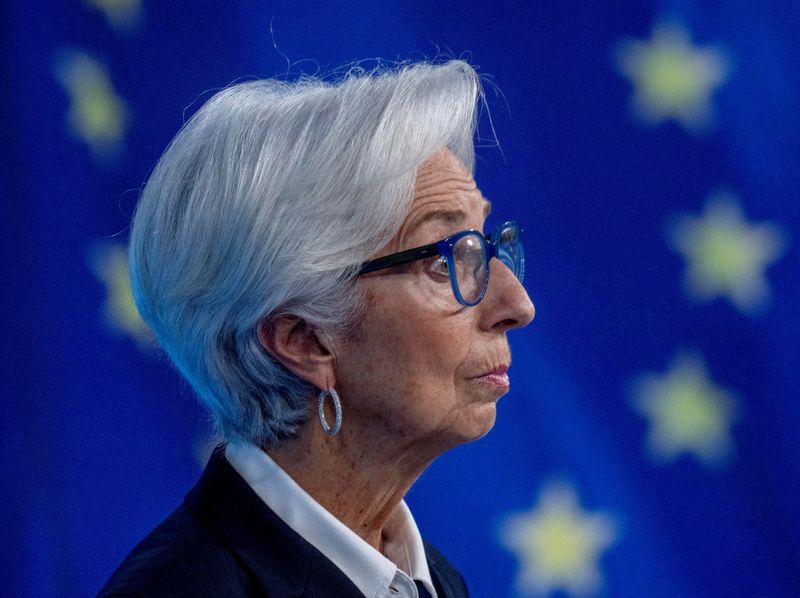Euro eases as Lagarde threatens to hike into restrictive territory

EUR/USD
0.30%
Add to/Remove from Watchlist
Add to Watchlist
Add Position
Position added successfully to:
Please name your holdings portfolio
Type:
BUY
SELL
Date:
Amount:
Price
Point Value:
Leverage:
1:1
1:10
1:25
1:50
1:100
1:200
1:400
1:500
1:1000
Commission:
Create New Watchlist
Create
Create a new holdings portfolio
Add
Create
+ Add another position
Close
By Geoffrey Smith
Investing.com — The euro eased on Monday as European Central Bank Christine Lagarde warned that inflation hasn’t peaked yet and left open the possibility of further aggressive interest rate increases — even as the Eurozone economy goes into reverse.
By 11:00 ET (16:00 GMT). the euro was down 0.1% at $1.0389, unable to hold on to gains made earlier in the day.
«We do not see the components or the direction that would lead me to believe that we’ve reached peak inflation and that it’s going to decline in short order,» Lagarde said in her regular testimony to the European parliament. She added that «Whenever I ask my top-notch economists at the ECB… about the risk, the answer that I get at the moment is (that) risk is to the upside, without qualifying the upside.»
Various ECB officials — including the hawkish Deutsche Bundesbank head Joachim Nagel, have indicated that the ECB‘s next rate hike may be smaller than the last two moves of 75 basis points each. The obvious slowdown in the Eurozone economy has raised the risk that the central bank could tip it into a recession by tightening policy too far. However, the ECB still has some of the lowest interest rates in the world, despite inflation hitting a euro-era high of 10.6% in October.
Data released earlier on Monday by the ECB showed new lending to households and businesses fell in October, while household deposits in the financial system also rose at their slowest rate since the start of the pandemic, suggesting that consumers are able to save less due to the effects of inflation.
Responding to other questions, Lagarde said that the bank may need to raise interest rates to a level that would actively slow the economy, citing pressures from pent-up demand that have percolated through the economy this year as COVID-19 restrictions have been lifted. She also pointed to the bank’s intention to decide on the key principles for reducing its balance sheet, when its governing council next meets in December.
In addition, Lagarde appeared to take a more hawkish view of current wage developments than the bank’s chief economist Philip Lane, who styled a spate of stronger collective wage settlements across the Eurozone this year as essentially a one-off ‘catching-up’ with inflation rather than a driver of a longer-lasting wage-price spiral.
«Strong labour markets…are likely to support higher wages,» Lagarde said, adding that «Incoming data suggest that wages are picking up, and we will continue to assess their implications.»
Lagarde also warned governments against being too generous in their efforts to support the economy through what is likely to be a difficult winter, with sky-high energy prices and rising unemployment.
Fiscal support, she argued, «should therefore be targeted, tailored and temporary. It should be targeted, so that the size of the fiscal impulse is limited and benefits those who need it most; tailored, so that it does not weaken incentives to cut energy demand; and temporary, so that the fiscal impulse is not maintained longer than strictly necessary.»




